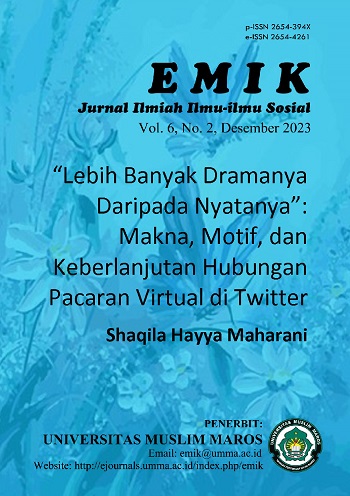“Lebih Banyak Dramanya Daripada Nyatanya”: Makna, Motif, dan Keberlanjutan Hubungan Pacaran Virtual di Twitter
DOI:
https://doi.org/10.46918/emik.v6i2.2037Keywords:
Pacaran, Virtual, Media Sosial, Online, TwitterAbstract
In the era of digital technology, which is increasingly rapid and developing with the creation of various social media applications, this opens a space for people to get to know each other through these media without meeting in person and building an intimate relationship, known as virtual dating. This virtual dating has become a trend among social media account users and one of the most common social media that is used for virtual dating is Twitter. While the existing literatures related to virtual dating is focused more on how social media is used to find virtual partners, this article explores virtual dating to gain an understanding of the meaning, motives, and sustainability of virtual dating relationships through Twitter.
This qualitative research was carried out using social media Twitter. Those who participated in this research were ten Twitter account users who have experience virtual dating. They are varied based on their initial place of meeting in the application with their virtual partners (via Twitter, Facebook, and Instagram, and online game Hago) and age (between 18 and 28). Data was collected using in-depth interview and observation techniques via Twitter.
The study shows that the meaning of virtual dating is broadly categorised into two: positive and negative meanings. The positive meaning is not only related to expressing love like in conventional dating, but also virtual dating is meant as romantic relationship that trains one’s patience, loyalty, and independence. Virtual dating is interpreted negatively since it is considered as a wasting time relationship, is prone to being cheated, and is an ineffective relationship. The underlying motives for someone to have a virtual dating is classified into three, namely (1) interest (such as pampered with gifts by virtual friends and interesting typing style); (2) feelings {such as too carried away by the treatment of virtual friends and high curiosity (kepo) about virtual dating, feelings of insecurity, trust issues}; and (3) real life condition {such as feelings boredom (gabut), not having a circle of friends in the real world (nolep), and having strict parents}. The continuity of virtual dating varies from failed relationships to successful relationship. The former is marked by the end of a relationship (ghosting) due to lost contact, feelings of boredom, not having the effort to meet each other, and having high expectations to the partner. The latter means having a meeting in the real world, even to the point of getting marriage. It is argued in this article that while the feeling and expectation in virtual dating are relatively the same as in real life dating, the former is not real, not until the romantic couple is met in a real life.
References
Anffani, Y.A.; dan Aji, G. G. 2022. "Pemaknaan dan Motif Peserta Virtual Blind Date dalam Ruang Komunikasi Virtual @ Virtualblinddate". E-jurnal Unesa, 5(3):313–322, https://ejournal.unesa.ac.id/index.php/Commercium/article/view/49054, diakses tanggal 16 Oktober 2023.
Arif, F. 2012. Interaksi Sosial Mahasiswa Dalam Situs Jejaring Sosial Studi Deskriptif Pada Mahasiswa FISIP UNAIR yang Mendapatkan Pacar Melalui Media Situs Jejaring Sosial. Disertasi, Fakultas Ilmu Politik dan Sosial, Universitas Airlanggga, Surabaya, https://repository.unair.ac.id/15286/2/gdlhub-gdl-s1-2012-ariffaizal-21260-1.FULLTEXT.pdf, diakses tanggal 16 Oktober 2023.
Ferina, A. 2020. Pengelolaan Ketidakpastian pada Pengguna Aplikasi Kencan dalam Membina Hubungan Romantis. Disertasi, Fakultas Komunikasi dan Diplomasi, Universitas Pertamina, Jakarta, https://docplayer.info/183803865-Pengelolaan-ketidakpastian-pada-pengguna-aplikasi-kencan-dalam-membina-hubungan-romantis.html, diakses tanggal 16 Oktober 2023.
Laras, N. A. 2021. “Pacaran, Yuk!”: Sebuah Studi Kasus Mengenai Proses Percintaan di LINE PLAY, Our Avatar World", Antropologi Indonesia: Jurnal UGM, 42(1):63-86, https://etd.repository.ugm.ac.id/penelitian/detail/160478, diakses tanggal 16 Oktober 2023.
Lawado, M. R. dan Sukardani, P. S. 2020. Komunikasi Antarpersonal pada Pasangan Berbasis Aplikasi Kencan Online: Studi Deskriptif Mahasiswa Negeri Surabaya Pengguna Aplikasi Tinder), Commercium, 2(2), https://ejournal.unesa.ac.id/index.php/Commercium/article/view/31642, diakses tanggal 16 Oktober 2023.
Manalu, S. R. 2017. "Penggunaan Media Sosial dalam Dinamika Hubungan Pacaran: Studi Terhadap Penggunaan Instagram pada Pasangan Berpacaran", Interaksi Online, 5(4):1-10, https://ejournal3.undip.ac.id/index.php/interaksionline/article/view/17472, diakses tanggal 16 Oktober 2023.
Perdana, M. W. G. dan Dewi, P. A. R. 2022. Proses Penetrasi Sosial Pada Perempuan Dalam Membangun Hubungan Romantis Melalui Aplikasi Kencan Online Bumble di Surabaya. Ejurnal Unesa, 5(2):225–236, https://ejournal.unesa.ac.id/index.php/Commercium/article/view/47987, diakses tanggal 16 Oktober 2023.
Tridarmanto, Y. K. (2017). Konsep dan Kebutuhan Berpacaran Remaja Awal di Yogyakarta. Skripsi, Fakultas Psikologi, Universitas Sanata Dharma, Yogyakarta, https://core.ac.uk/download/pdf/127701224.pdf, diakses tanggal 16 Oktober 2023.
West, R. dan Turner, L.H. 2008. Pengantar Teori Komunikasi Analisis dan Aplikasi. Jakarta: Salemba Humanika.









9.png)















